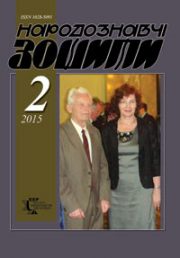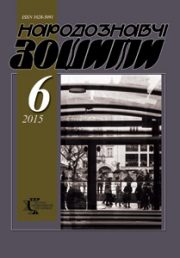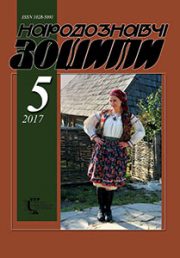The Ethnology Notebooks. 2021. № 5 (161), 1078—1086
UDK 398.3:639.1(477.87)”19/20″
DOI https://doi.org/10.15407/nz2021.05.1078
KOROL Vasil
- ORCID ID: https://orcid.org/0000-0002-0471-2115
- Ph. D. of Sciences in History, Senior Researcher
- Of the Municipal Institution «Transcarpathian Museum
- of Folk Architecture and Life»
- of the Transcarpathian Regional Administration,
- Kapitulna 33a, 88000, Uzhgorod, Ukraine,
- Contacts: e-mail: anshamach@gmail.com
Abstract. This article represents the state of modern life of the traditional hunting ritual, the magical practices which could to ensure successfully shot and to be like a charm for the gun against its spoiling under the influence of magic. Special attention is given to the hunter image in folk hutsuls belief of Transcarpathia. A rite of «calling of the lynx» to alleviate of death suffering of hunter is being analyzed separately. Clarification of specificity of the hunting tradition of the separate ethnographical regions for the modern ethological science is extremely actual.
The main purpose of this article is ethnographical description of the traditional hunting knowledge (about animals, tracking, luring the beast, forms of hunting, folk hunting traps), the beliefs and the magical practices («directional gun» creation, a rite of «calling of the lynx» and etc.) which used by hutsuls of Transcarpathia in the early XXI century.
The methodological basis of the research serves the principle of historicism, objectivity, complexity, systematically; typology and the basic techniques of the ethnological science: historically-comparative, typology, analysis and synthesis.
The research area includes Rakhivsky district of Transcarpathian region, chronological boundaries of study — the first half of the XX — beginning XXI century.
The work is written on the basis of the own field ethnological material gathered by crude methods and covers individuals areas of traditional knowledge and belief of hunters of Transcarpathian Hutsuls region.
Keywords: Hutsuls region, hunter, belief, hunting, trap, gun, charming, shot, talisman, tradition, rite, demonology, magic.
Received 2.08.2021
REFERENCES
- Shukhevych, V. (2018). Hutsul region: in 5 arts (Reprint edition 1899—1908 rr.). Kharkiv: Vydavets Oleksandr Savchuk [in Ukrainian].
- Onyshchuk, A. (1912). Remains of primitive culture in Hutsuls. Recorded in Zelena, Nadvirna district. Materials on Ukrainian ethnology (Vol. XV, pp. 159—177). Lviv [in Ukrainian].
- Potushniak, F. (1942). Shooting in the folk belief. Literary Sunday (Yearbook II, pp. 148—151). Uzhhorod [in Ukrainian].
- Potushniak, F. (1941). Snake in the folk belief. Literary Sunday (Yearbook I, pp. 88—90, 101—103). Uzhhorod [in Ukrainian].
- Mandybura, M.D., & Fedyna, R.I. (1987). Auxiliary classes. Hutsul region: Historical and ethnographic research (Pp. 146—157). Kyiv: Naukova dumka [in Ukrainian].
- Romaniuk, V. (2011). Beliefs of hunters of the Ukrainian Carpathians. The Ethnology notebooks, 2, 207—214 [in Ukrainian].
- Romaniuk, V. (2009). Hunting magic of Hutsul region (end of XIX — middle of XX centuries). Folk culture of Ukraine: traditions and modernity: materials of the International scientific conference dedicated to the 40th anniversary of the National Museum of Folk Architecture and Life of Ukraine, Kyiv, October 8—10, 2009 (Pp. 300—306). Kyiv [in Ukrainian].
- Romaniuk, V. (2011). Folk hunting ethics of Ukrainians in the Carpathians. Humanities and Social Sciences: Proceedings of the III International Conference of Young Scientists HSS-2011, November 24—26, 2011, Lviv, Ukraine. Lviv Polytechnic National University (Pp. 66—67). Lviv: Vydavnytstvo Lvivskoi politekhniky [in Ukrainian].
- Romaniuk, V. (2008). Traditional hunting traps in the Ukrainian Carpathians in the second half XIX — the first part XX century. The Ethnology notebooks, 1—2, 74—84[in Ukrainian].
- Romaniuk, V. (2009). An active form of traditional hunting in the Ukrainian Carpathians in the second half XIX— middle XX century. The Ethnology notebooks, 5—6, 685—693 [in Ukrainian].
- Dmytrenko, A. (2013). Ethnocultural traditions of hunting in Zhytomyr Polissya. Scientific Bulletin of the Lesia Ukrainka East European National University. Historical sciences, 22, 185—190). Lutsk [in Ukrainian].
- Dmytrenko, A. (2006). Hunting taboos, beliefs and omens. Ethnic History of the Peoples of Europe (Issue 21, pp. 20—28). Kyiv: Uniserv [in Ukrainian].
- Arkushyn, H. (1996). Beliefs of hunters of Western Polissya. Drevlyany: Collection of articles and materials on the history and culture of Polissya region (Issue 1, pp. 183—193). Lviv [in Ukrainian].
- Korol, V.V. (2018). Field materials on the topic «Folk demonology and folk magic». In Funds of the Communal Institution «Transcarpathian Museum of Folk Architecture and Life» of the Transcarpathian Regional Council. (KZ «ZMNAiP» ZOR LM). 15755/1706 [in Ukrainian].
- Benkovsky, Y. (1898). Beliefs and superstitions related to hunting. Kyiv antiquity, 7 (Vol. LXI, pp. 9—14) [in Ukrainian].
- Sumtsov, N.F. (1890). Cultural experiences [Research on the South Russian folklore with the involvement of folklore material of all Slavic and Aryan peoples]. Kyiv: Kievskaya Starina [in Russian].
- Seweryn, T. (1932). Lowiectwo ludowe na Wolyniu. Lud (Vol. XI, pp. 24—35). Lwow; Warzawa; Krakow; Poznan; Wilno [in Polish].
- Iudyk, V. (2018). Misliviness and ribalism in the village of Yasinya and the outskirts. Ethnika of the Carpathians (Issue 3, pp. 264–269). Uzhgorod [in Ukrainian].
- Tokarev, S.A. (1957). Religious beliefs of the East Slavic peoples: XIX — early XX century. Moscow; Leningrad [in Russian].






